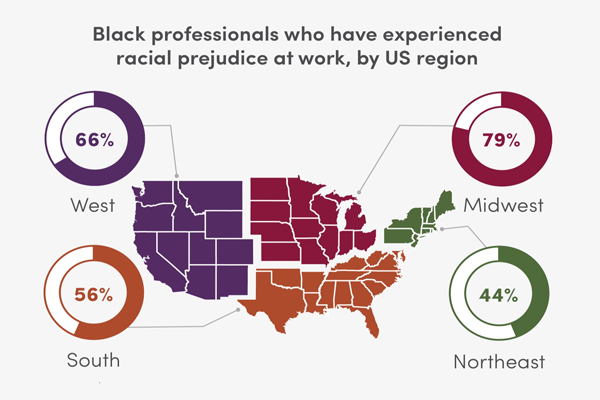Corporate America needs to wake up to the challenges faced by Black professionals, according to a new study published yesterday by non-profit think tank, Center for Talent Innovation (CTI).
Despite billions spent on diversity and inclusion (D&I), Black professionals face prejudice, a lack of support from managers, and a cycle of exclusion that keeps them from the C-suite, reveals the CTI study.
Black professionals are more likely to encounter prejudice and micro-aggressions than any other racial or ethnic group, says the study, entitled Being Black in Corporate America: An Intersectional Exploration. They are less likely than their white counterparts to have access to senior leaders and to have support from their managers. Yet few white professionals see what their Black colleagues are up against. Approximately 65% of Black professionals said they ‘have to work harder in order to advance’, yet only 16% of their white colleagues agree with that statement.
“This report sounds the alarm that, despite many good intentions, companies are falling short of creating equitable workplaces for black employees,” comments Pat Fili-Krushel, CEO of CTI. “We hope that business leaders will respond to these findings by making a serious assessment of their own workplaces and creating a comprehensive plan of action. We are especially concerned about the lack of awareness we discovered among white professionals. This report gives business leaders a path for moving forward.”
SYSTEMATIC RACIAL PREJUDICE
The study also reveals that Black employees are more likely than White professionals to be ambitious, and more likely to have strong networks. Yet, despite these assets, Black professionals hold only 3.2% of all executive or senior leadership roles and less than 1% of all Fortune 500 CEO positions. The CTI report highlights the systemic racial prejudice in the workplace that underpins low representation at the top. Black professionals are nearly four times as likely as their white counterparts to say they have experienced racial prejudice at work (58% versus 15%), and also more than their Latinx (41%) and Asian (38%) colleagues.
According to the report, racial prejudice varies from state to state. Around 79% of Black professionals in the Midwest say they have experienced racial prejudice at work, compared to 66% in the West, 56% in the South, and 44% in the Northeast. Higher rates of racial prejudice in regions like the Midwest could partly be down to lower Black population levels in those states, notes the study: ‘Without much exposure to Black people, colleagues have fewer opportunities to correct for stereotypes they’ve picked up’.

THE SHOCKING FACTS
The shocking statistics highlight that round 43% of Black executives have had colleagues use racially insensitive language in their presence, confirms the study. Furthermore, nearly 1 in 5 (19%) feel that someone of their race/ethnicity would ‘never’ achieve a top position at their companies, compared to just 3% of White professionals who feel this way. Also Black women are less likely to have access to the same support and advocacy as white women. For instance, 35% of White women have individuals in their networks, who have advocated for their ideas and skills, compared to just 19% of Black women.
Commenting on the survey results, Julia Taylor Kennedy, Executive Vice President at CTI, states: “We can only create change and impact when we fully understand how systemic prejudice and microaggressions play out in our workplaces. Right now, it’s a lose-lose situation. Companies are missing out on amazing talent at the top of their organisations, and Black professionals are not given the opportunity to fulfill their aspirations. This report delivers the facts and, in doing so, will spur conversations that move companies, and society, forward.”

INEFFECTIVE D&I STRATEGIES
Only 40% of all employees of all races think their companies have effective D&I programmes, reveals the CTI study. Black full-time professionals are also more likely than their White full-time colleagues to say that ‘White women are the primary beneficiaries of D&I efforts’ (29% versus 13%). In addition, the report finds that talented Black professionals are much more likely than their White counterparts to opt out of their corporate jobs to start entrepreneurial ventures. Black professionals who have worked at both large and small companies are also more likely to find an environment of trust, respect, and a sense of belonging at small companies, compared to large companies.
“Companies often use the phrase ‘diverse talent’ to describe underrepresented groups, but they need to understand the diversity within their diversity,” says Pooja Jain-Link, Executive Vice President at CTI. “Black professionals have a different experience in the workplace than professionals of other races. If companies want to truly engage and retain black talent, they need to be courageous and design targeted interventions that take these unique experiences into account. With this report, we are calling upon leaders to think big and start a new movement that reimagines diversity and inclusion in ways that have not been done before.”

ROADMAP FOR D&I LEADERS
Corporations that wish to retain Black professionals should offer the same, suggests the report. In addition, the report delivers a roadmap that calls upon leaders to audit their workplaces, and to create conversations that awaken white employees to the workplace prejudice that their black colleagues face. It also provides a multifaceted analysis, including solutions, for creating workplace cultures where black employees can do their best work and succeed.
“Study after study has shown that black executives perform as well as or better than other executives but are not advanced to the highest levels,” adds Skip Spriggs, president and CEO of The Executive Leadership Council, a research partner on the report. “The roadmap offered by CTI as a result of this study could make a difference because it is rooted in intentional, results-oriented actions designed to effect measurable, positive change.”
Click here for more information.








































